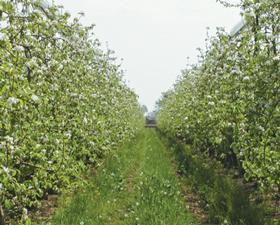
The European Union is heading for its smallest apple crop in the last ten years as a result of the damaging spring frost. Production is expected to decline in France, but to a lesser extent than its European neighbours, putting French growers at an advantage this season, according to Josselin Saint-Raymond, director of the National Association of Apples and Pears (ANPP).
“The apple harvest is a little early this year, by a week or even a fortnight, depending on the production area,” he said in an interview with French daily, Ouest France. “The quality is there: we have the right sweetness, acidity and colouring, good sizes and a good taste. Forecasts show that French production will be down by 8 per cent from 2016, which was already a low production year, and 18 per cent down on 2015, when the orchards reached their full potential.'
'This decline was caused by the frost in late April, which caused considerable damage, mainly in the north, in Alsace, the Alps, the Loire Valley and Normandy,' he explained. The decline in production was lower than in neighbouring countries, thanks to the high flowering and excellent pollination conditions in France. That's what saved us.”
The European Union has recorded its lowest harvest since 2007, Saint-Raymond pointed out, with the frost affecting most countries.
“Poland, the leading producer, has experienced a 29 per cent drop in its crop compared to 2016,” he said. “Italy, the second largest producer, is down by 23 per cent. The decline is 46 per cent in Germany, 25 per cent in the UK and 68 per cent in Belgium. In total, the estimated European harvest for 2017 is 9.3m tonnes, down by 21 per cent from 2016 and 23 per cent below the average of the last three years.”
Saint-Raymond stressed that the French market would be supplied as a priority, even if that means reducing volumes available for export.
“France exports 600,000-650,000 tonnes a year, or almost one in two apples,” he said. “70 per cent of this volume is destined for the European market. Other destinations are the Middle East (14 per cent), the Near East (8 per cent), Asia (5 per cent) and the US (1 per cent). In 2016, another year of low production, exports declined significantly.”
Meanwhile, the Russian embargo continues to hurt exporters, depriving them of an outlet for around 50,000 tonnes of apples. In addition, the Algerian market, previously the third largest customer for French apples at 80,000 tonnes a year, has also closed, as the country seeks to develop its own apple production following the fall in the price of oil.
According to Saint-Raymond, production declines in Belgium, Germany and the UK will help to create a more positive trading environment, with the new balance between supply and demand resulting in higher prices and larger retailers offering suppliers a reasonable increase of €0.20-€0.40 per kilo.
The main challenge for the French apple sector remains the renewal of the country’s orchards, said Saint-Raymond. French orchards have declined by 13,000ha since 2000.
“The future depends on the planting of varieties adapted to the tastes of consumers,” he said. “Club varieties like Ariane, Choupette, Pink Lady and Temptation are developing in this direction. The orchards need to be ecologically efficient. The ideal situation would be to replant 5-6 per cent of our orchards each year, but we are nowhere near. Arboriculturists are an ageing breed. We need to bring new generations through and we need the support of the state. Access to water is also crucial, not just for irrigation, but also and above all for the protection of orchards from frost through sprinkling.”
1,400 growers, or 60 per cent of French apple growers, are now part of the country’s eco-responsible orchard system, limiting phytosanitary applications and using integrated pest management to combat harmful insects.
“These efforts open the doors to the French market, where environmental concerns are high,” said Saint-Raymond. “For exports, environmental concerns are less important, with price and taste remaining decisive.”






No comments yet